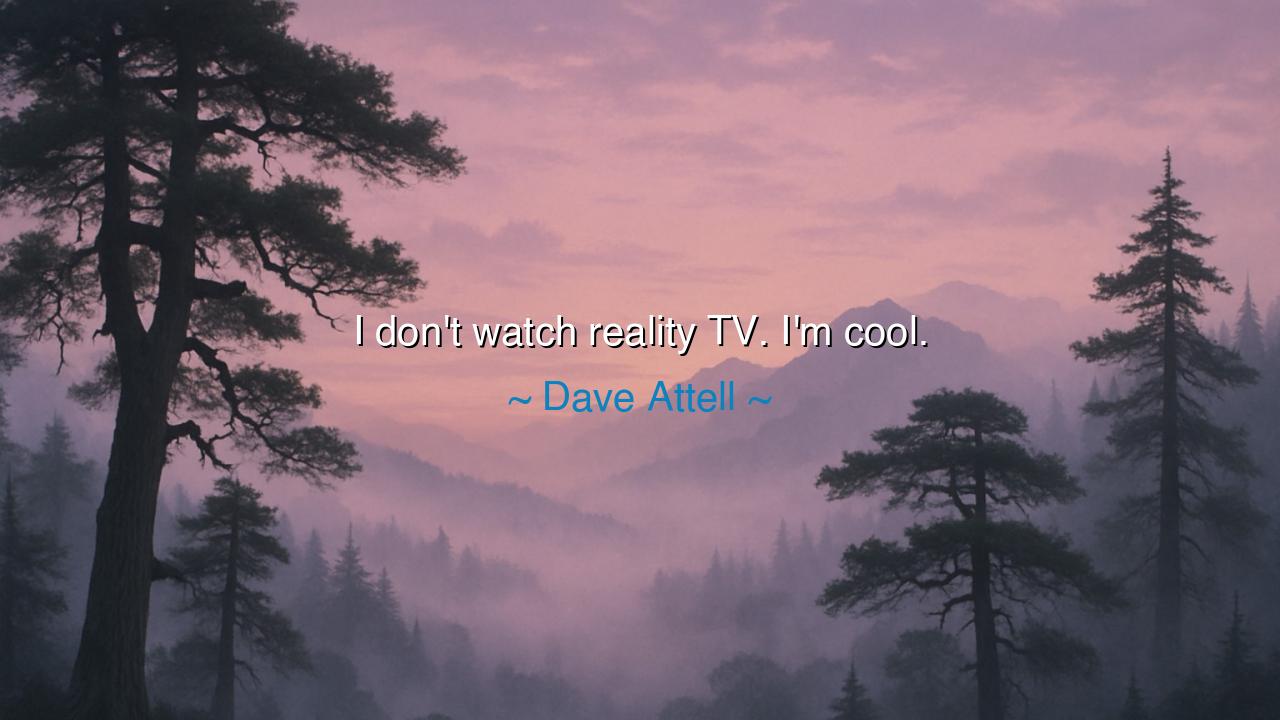
I don't watch reality TV. I'm cool.






In the candid words of Dave Attell, “I don't watch reality TV. I'm cool,” we are confronted with a playful yet profound assertion of individuality and self-assurance. Attell, known for his sharp wit and irreverent humor, speaks to a deep, often unspoken truth in modern culture: the importance of staying true to oneself in the face of social pressures and mass entertainment. His refusal to engage in reality TV, a form of entertainment that dominates the modern landscape, is not just a personal preference, but a bold statement about the value of authenticity and independence in a world increasingly obsessed with the superficial.
This declaration reflects an ancient wisdom found in the teachings of Socrates, who believed that the highest form of living was one rooted in self-examination and the pursuit of truth. Socrates famously said, "The unexamined life is not worth living." In this, he implored the people of Athens to look beyond the distractions of the world around them, to seek not just external approval or shallow entertainment, but to pursue something deeper—meaningful engagement with their own values and the world around them. Attell’s rejection of reality TV can be seen as a modern echo of this call: to be cool is not to follow the crowd, but to stay firmly rooted in one’s own principles and truth.
Socrates’ philosophy on self-awareness and wisdom offers a strong contrast to the mindless consumption encouraged by popular media. Much like Attell’s refusal to engage with reality TV, Socrates would have likely scoffed at the spectacle of mindless entertainment that offers little more than superficial drama and fleeting distractions. To be cool, in the sense that Attell suggests, is to rise above the frenetic energy of the masses, to reject the pursuit of empty thrills in favor of a life lived with purpose and depth. This does not mean rejecting all forms of entertainment, but it does mean choosing carefully what we allow to shape our minds and spirits.
Similarly, the life of Marcus Aurelius, the Stoic emperor and philosopher, reveals the profound peace that comes from resisting the distractions of the world. Aurelius famously wrote in his Meditations that one should focus not on external things, but on internal values and virtue. He spent his life practicing self-discipline, rejecting the temptations of luxury and superficial pleasures, in favor of a life of reflection, personal growth, and leadership based on virtue. If we apply Attell’s words to the ancient wisdom of Aurelius, we see that being “cool” is not about following the herd, but about cultivating inner strength, clarity, and purpose—qualities that allow us to stand apart from the distractions that society often thrusts upon us.
Take, for instance, the story of Leonardo da Vinci, who, though living in a time vastly different from ours, exemplified the ultimate coolness through his commitment to discovery and innovation. Da Vinci was not concerned with the trends of his day, nor did he seek the approval of others. His mind was focused on the deeper questions of the universe, the workings of the human body, and the essence of art. Da Vinci's coolness came from his unique path—one of deep curiosity, discipline, and a commitment to personal mastery. Like Attell, da Vinci did not conform to the fleeting interests of his time; instead, he transcended them, creating works that would inspire generations to come.
In the same vein, Attell’s statement about not watching reality TV speaks to the timeless challenge of maintaining independence in a world that constantly seeks our attention with the shiny, the new, and the shallow. It is an invitation to question the things we consume, to consider what truly enriches our lives, and to guard our attention from the superficial distractions that so often dominate the cultural landscape. Just as Marcus Aurelius taught us to turn inward and focus on the growth of the soul, Attell’s message is a call to recognize that true coolness lies in the ability to maintain our sense of self and purpose, even when the world around us is filled with noise and distractions.
The lesson here is clear: true coolness is not a matter of following trends or conforming to popular culture, but about living authentically, cultivating our own values, and standing firm in the face of external pressures. Whether in ancient times or in the modern world, the wise have always understood that external validation is fleeting, and that true fulfillment lies in being true to ourselves. Attell challenges us to reject the superficiality that often defines public life, and instead to cultivate depth—to live with integrity, to question the world around us, and to make decisions based on our own sense of truth and purpose.
In practical terms, we must be vigilant in what we allow to influence us. Just as Socrates rejected the distractions of the Athenian marketplace, we must reject those shallow pursuits that serve only to dull our minds and hearts. Whether it is in the media we consume, the people we associate with, or the ways we spend our time, we must choose wisely. Like Attell, we must recognize that to be cool is not to follow the crowd, but to cultivate an authentic self that lives with purpose and clarity. The true measure of coolness lies not in trends, but in the strength of our character and the depth of our actions.






AAdministratorAdministrator
Welcome, honored guests. Please leave a comment, we will respond soon